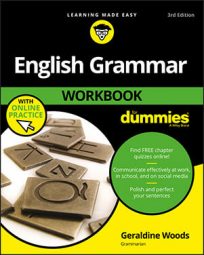- Pronouns ending in -one, -thing, and -body (everyone, something, and anybody, for example) are singular. So are each and every. Even though they sometimes sound plural, everyone is here and nobody needs more grammar rules. And no matter what follows each or every, you’re in singular territory and need a singular verb (“each of the computers is, every tablet and laptop has).
- All, some, most, none, and any can be either singular or plural. Subjects that can be counted are plural. (“All of the ears are sticking out. Some of the ears are going to be super-glued to scalps.”) A subject that is measured but not counted is singular. (“Most of the sugar in his diet comes from his doughnut habit. None of his food contains anything nutritious.”)
- Either and neither alone, without or and nor, are singular. These pronouns are often followed by a prepositional phrase that makes you think you’re in plural territory, but you’re not. (Either of my cousins is happy to escort you to the ball.)
- In either/or and neither/nor sentences, match the verb to the closest subject. You can do these sentences by measuring the distance between the subject and the verb with a ruler! (“Neither of my uncles has agreed to take me to the movies this afternoon.” “Either Josh or his partners are going to jail. Either his partners or Josh is going to jail.”)
Practice questions
Test yourself with these questions. Write the correct form of the verb in parentheses.- Either of the principal singers (has/have) enough talent to carry the musical.
- I don’t understand the tattoo fixation because neither of Lola’s parents (has/have) any tattoos.
Answers to practice questions
- has. Without a partner, either is always singular and rates a singular verb, such as has.
- has. When it’s all alone, the pronoun neither is always singular and needs to be paired with the singular verb has.

